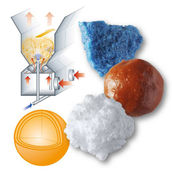NJIT Chemists Modify Carbon Nanotubes Using Microwaves
Advertisement
Researchers at New Jersey Institute of Technology have discovered a novel method of changing the chemical characteristics of carbon nanotubes by heating them in a closed vessel microwave oven. Somenath Mitra, PhD, professor of chemistry and environmental sciences, and Zafar Iqbal, PhD, also a professor of chemistry and environmental sciences, have written "Microwave-Induced, Green and Rapid Chemical Functionalization of Single-Walled carbon Nanotubes" to be published in a forthcoming issue of the journal Carbon.
With a microwave oven hitting temperatures of 250 degrees Celsius, the researchers can chemically modify the tubes. Such a temperature is closer to radiation treatment than the output of a kitchen microwave oven. Since the reactions are fast, the nanotubes are not damaged or structurally modified. Once the tiny, microscopic tubes are chemically altered, they become soluble in common solvents like water and alcohol, and new kinds of films or coatings can be produced. The tubes can also be formulated into paints and plastic nanocomposites. The functionalized nanotubes become more useful than the pristine ones because the functionalized groups can be tailored for specific applications.
"We understand ourselves to be the first in the world to have discovered this method," said Mitra. "The beauty is that our method is green and clean. We use no toxic material and reduce the reaction times from hours-on occasion even days-to three minutes."
Iqbal noted that the method costs much less than others currently used. "Plus, the solubility of our carbon nanotubes are several times higher than any other researcher has yet reported in this short amount of time." Solubility is the most essential characteristic of carbon nanotubes since researchers must be able to dissolve them to see them work their magic.
Other news from the department science
These products might interest you

Get the chemical industry in your inbox
By submitting this form you agree that LUMITOS AG will send you the newsletter(s) selected above by email. Your data will not be passed on to third parties. Your data will be stored and processed in accordance with our data protection regulations. LUMITOS may contact you by email for the purpose of advertising or market and opinion surveys. You can revoke your consent at any time without giving reasons to LUMITOS AG, Ernst-Augustin-Str. 2, 12489 Berlin, Germany or by e-mail at revoke@lumitos.com with effect for the future. In addition, each email contains a link to unsubscribe from the corresponding newsletter.































































